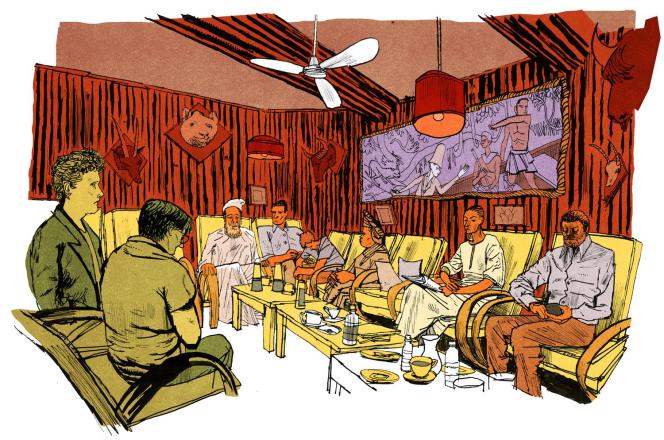This investigation in four episodes, originally published in English in the American magazine In These Times, was supported by a grant from the Leonard C. Goodman Center for Investigative Reporting.
In late February, the day after their visit to the Rosso border post between Senegal and Mauritania, MEPs Cornelia Ernst and Tineke Strik drive two hours southwest to meet with a group of community leaders in the town. coast of Saint-Louis. Named in honor of King Louis IX, canonized after his death, the city was once the capital of French West Africa (AOF). Today, it is the epicenter of the migration debate in Senegal.
In a hotel conference room, Cornelia Ernst, Tineke Strik and their delegation meet with leaders of the local fishing community to discuss the plan to deploy Frontex guards and, more generally, migration in the region. The deputies and their assistants are seated on one side; the premises of the other. On the wall behind the Senegalese, a painting represents a canoe sailing on a Senegalese river: seated at the front of the boat, a white man wearing a pith helmet reprimands the two African rowers. The irony is strong, the atmosphere tense.
For dozens of generations, the economy of Saint-Louis has been based on the ocean. Small-scale fishing, the mainstay of the local diet, represents 95% of the national fish market. Fishermen, women who process fish for sale, boat builders, painters and local distributors all depend on fishing as it has been practiced here for centuries.
Offshore gas platform
However, in 2014, the European Union (EU) and the Senegalese government signed an agreement allowing large European vessels to fish off the West African coast. Ships that are decimating the fishing resources of this once abundant area and are wreaking havoc on the economy. Since the European ships cast their first nets, the fishermen of Saint-Louis have had to move further and further from the coast to find fish. And now that the Chinese trawlers are also part of the game, it is not uncommon for small fishermen to travel a hundred kilometers.
Added to this is the new offshore gas platform of the British company BP, which has won over European leaders: they see it as a way of reducing their energy dependence on Russia. For Senegalese fishermen, on the other hand, it is a vast area where they cannot fish either. They also lament that the Coast Guard, whose mission was originally to search and rescue fishermen in distress, is now more concerned with monitoring the foreign platform. “With gas exploitation, a lot of people get rich at the expense of the lives of fishermen”denounces Moustapha Dieng, then secretary general of the National Union of Artisanal Fishermen of Senegal.
You have 47.53% of this article left to read. The rest is reserved for subscribers.
